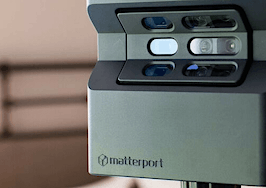Matterport has made a name for itself as one of the preeminent providers of cameras and software for capturing detail-rich 3D, interactive tours used in many online real estate listings.
Today it announced a major pivot: the company is opening its platform to consumer cameras and drastically slashing prices for the subscription plans needed to host its tours, down from $50 to free for a starter plan.

RJ Pittman
“Matterport Cloud 3.0” as the new initiative is dubbed, is a kind of philosophical realignment that will see the company shifting from a maker of $3,000 cameras into the role of a “software platform,” new Matterport CEO RJ Pittman, a former EBay executive, told Inman.
Pittman, who took the reins of Matterport last month, said his hope is to create a “starter experience” that lowers the barriers to getting started with its 3D tours and moves the company from having mapped “millions of spaces” to a goal of “100 million spaces.”
“This is a way to get people started and into the program and Matterport-ing in 3D,” Pittman said.
Probably the most interesting part of the shift is that Matterport will now integrate two new third party cameras: Ricoh’s Theta V and Insta360‘s ONE X.
Both cameras are about the size of a cellphone and shoot interactive, 360 degree photos — like the kind you occasionally see while scrolling through Facebook. Significantly, both the new cameras retail at or around $400.
That price point, Matterport hopes, allows far more people to take advantage of the platform, which in the past required using cameras that cost at least $3,000.
Pittman said that opening the platform up to consumer grade or “pro-sumer” grade cameras was made possible because Matterport has now developed the ability to convert a two dimensional image into a 3D space. The conversion relies on a “large training set of data” that the company has compiled over the years.
“That’s a big breakthrough,” Pittman explained, “where we’re really unlocking, or decoupling ourselves, from any one specific camera.”

An Image360ONE X camera. Credit: Matterport and Image360
Matterport chief marketing officer Chris Bell told Inman that the company is also exploring relationships with other camera makers, including Garmin, though integration with additional products has not been finalized yet.
Insta360’s partnership with Matterport comes as the company has made a fast entry into the immersive tour market, forging partnerships with iStaging, immoviewer, Cupix, VPiX, and Kuula. And in a statement today, Insta360 said that it is aiming to become the premier camera choice for virtual tour creators in real estate, hospitality and tourism.
The other major component of Matterport’s metamorphosis into, first and foremost, a software platform is the restructuring of its subscription services.
Previously, using Matterport required not only getting an expensive camera, but also paying for a monthly subscription to have the company host the massive 3D files the cameras produced. The cheapest plan cost around $50 per month and allowed users to scan up to 100 spaces.
Under Matterport Cloud 3.0, users will still need a monthly subscription in order to have the company convert their images to 3D and then host them. But Pittman said the pricing has been significantly reduced and simplified.
At the lowest end, the company will offer a free option that will let users scan one space in 3D and share it privately. Exact details on how that option will function are still being worked out, but Pittman compared it to the way YouTube allows users to create private videos that can’t be publicly viewed.
For users who want to publicly share the spaces they scan — which probably applies to most Realtors — Matterport will offer a subscription plan for $10 a month that accommodates up to five spaces. As before, pricing follows a tiered system that increases with more and more spaces.
Other changes that are part of Matterport’s shift include enhancements to its cloud system and an app that runs on iPhones rather than just iPads. The company also has plans to unveil an app for Android phones sometime in the future.
Though all of these shifts represent a fairly monumental change for Matterport, Pittman said the company is not abandoning its core services or cameras. The Pro 2 — the company’s $3,000 camera — will still shoot higher definition images than the newly integrated consumer cameras, for example. Pittman also said higher end equipment offers more options, such as precise measurements that are useful in construction applications, and can be more productive for users doing a high volume of captures.
Pittman went on to explain that instead of replacing Matterport’s previous offerings, the pivot is ultimately meant to expose more people to the company’s ecosystem. And eventually over time, the company hopes, that some of those new users graduate up to more professional services.
“You can capture and recapture and play around with it as much as you want and it’s intended to kind of get your feet wet,” Pittman said of Matterport’s new mass market, software focus. “It’s really intended to get your started and then move you up the chain.”













